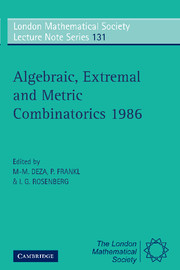Book contents
- Frontmatter
- Contents
- Introduction
- List of Talks
- Participants
- Some Recent Combinatorial Applications of Borsuk-Type Theorems
- On Extremal Finite Sets in the Sphere and Other Metric Spaces
- Metric and Geometric Properties of Sets of Permutations
- Infinite Geometric Groups and Sets
- Intersection and Containment Problems Without Size Restrictions
- Distance-Transitive Graphs of Valency k, 8 ≤ k ≤ 13
- Latin Square Determinants
- A Computer Search for a Projective Plane of Order 10
- Matroids, Algebraic and Non Algebraic
- Algebraic Properties of a General Convolution
- Quasi Groups, Association Schemes, and Laplace Operators on Almost Periodic Functions
- Geometric Methods in Group Theory
- Problem Section
Quasi Groups, Association Schemes, and Laplace Operators on Almost Periodic Functions
Published online by Cambridge University Press: 05 April 2013
- Frontmatter
- Contents
- Introduction
- List of Talks
- Participants
- Some Recent Combinatorial Applications of Borsuk-Type Theorems
- On Extremal Finite Sets in the Sphere and Other Metric Spaces
- Metric and Geometric Properties of Sets of Permutations
- Infinite Geometric Groups and Sets
- Intersection and Containment Problems Without Size Restrictions
- Distance-Transitive Graphs of Valency k, 8 ≤ k ≤ 13
- Latin Square Determinants
- A Computer Search for a Projective Plane of Order 10
- Matroids, Algebraic and Non Algebraic
- Algebraic Properties of a General Convolution
- Quasi Groups, Association Schemes, and Laplace Operators on Almost Periodic Functions
- Geometric Methods in Group Theory
- Problem Section
Summary
Abstract. The association scheme determined by a finite nonempty quasigroup furnishes generalized Laplace operators Δ1 on the space of almost periodic functions on the free group that is the universal multiplication group of the quasigroup. An existence theorem is proved for solutions of the equation Δiu = 0 on the closed convex hull of the set of twisted translates of a given almost periodic function f. This theorem generalizes the classical result on the existence of von Neumann means of almost periodic functions.
INTRODUCTION
There is a well–known and intimate connection between the character theory and the ordinary representation theory of a finite group: characters are traces of matrix representations, and determine the representations up to equivalence. For a finite non–empty quasigroup Q, the connections are much more obscure. The character theory is that of the association scheme (Q×Q; C1,…,Cs) determined by the permutation representation of the combinatorial multiplication group on the quasigroup [1, pp. 181·2] [3] [6]. The representation theory is that of free groups determined by the quasigroup – the universal multiplication group and point stabilizers within it [6]. Representations are classified by almost periodic functions on these free groups. The character theory furnishes generalized Laplace operators Δ1,…,Δs acting on the almost periodic functions.
- Type
- Chapter
- Information
- Algebraic, Extremal and Metric Combinatorics 1986 , pp. 205 - 218Publisher: Cambridge University PressPrint publication year: 1988



